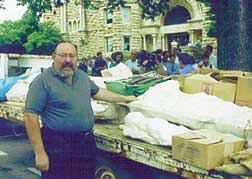Dakota Aquifer Management Information
In many areas of western and central Kansas, the water in shallow aquifers
and at the surface will be inadequate to meet future demands. Because
the only other source of water in these areas is the Dakota aquifer, proactive
management planning is desirable to prevent overdevelpment. A new KGS
circular, Water-supply-suitability Areas of the Dakota Aquifer in
Kansas, by Allen Macfarlane, Geohydrology Section, outlines proposed
suitability areas in the Dakota aquifer based on local conditions, water
quality, and the aquifer’s response to pumping. This information
may be useful in developing water-management plans and policies for the
Dakota aquifer in Kansas.
Copies of Public Information
Circular 8 can be obtained online or free of charge by contacting
Publications Sales at the Survey.
Wichita’s Building Stone
A trip to Wichita, Kansas, to look at rocks and minerals from around the
world suggests a new museum or traveling exhibit is in town. Not so! As
a new Survey publication describes, these rocks are displayed on the buildings
in Wichita. Wichita’s Building Blocks: A Guide to Building Stones
and Geological Features explores some of the rocks, minerals, fossils,
and other geological features that are visible downtown and in other areas
of Wichita. This 32-page publication discusses these features and serves
as a tour guide to the sites. The author is Larry Skelton, manager of
the Survey’s Well Sample Library in Wichita.
Wichita’s Building Blocks: A Guide to Building Stones and Geological
Features (Educational Series 11) is available from the KGS for $7.50
plus tax, shipping, and handling.
Elk County Geologic Map
A new geologic map of Elk County, showing the age and type of rocks at
the earth’s surface, is now available. Because geologic maps show
the rock formations likely to be encountered in a given location, they
are useful in construction, in understanding soils and agriculture, in
searching for water and mineral deposits, and in a variety of engineering
and environmental uses.
The Elk County geologic map, compiled by Survey geologist Daniel Merriam,
is part of a Survey program to produce new geologic maps of counties in
the state.
The map is drawn at a scale of 1:50,000 (one inch on the map equals about 3/4 mile). Copies of the new map are available from the Kansas Geological Survey for $15.00, plus tax, shipping, and handling.
New
Publications

Soldier's and Sailor's Monument from Wichita's Building Blocks.
A recently discovered dinosaur
dubbed Lyle arrived at KU’s Natural History Museum this summer.
Lyle appears to be a camarasaurus (kuh-MARE-uh-sar-us), said Larry Martin,
the museum’s curator of paleontology. Like its relatives, the brontosaurs,
Lyle is a large member of the sauropod family. “We’ve got
a thigh bone that’s over 5 feet long and weighs more than 600 pounds,”
Martin said. Lyle’s curved back was 14 feet off the ground. Uncovered
on a Wyoming ranch on the western edge of the Black Hills, Lyle is one
of the most complete sauropods ever found. “The only bones missing
are two neck vertebrae,” said Craig Sundell, the graduate student
who made the find.
The skeleton is about 150 million years old, Martin said, which means Lyle was around before flowering plants appeared on Earth. The evidence suggests that Lyle and two other camarasaurs (a smaller adult and a baby named Knicknack) were caught in a flood. As they were swept along, Lyle lodged on a sandbar, forming a dam against which the other two camarasaurs piled up. Also uncovered in the pile were the remains of crocodiles, turtles, and a meat-eating dinosaur called a theropod. The discovery of a parent and baby together, Martin said “is a real indication that these dinosaurs traveled in family groups and that the young stayed with the adults.”
Sauropod Arrives at Natural History Museum

URL:http://www.kgs.ku.edu/Publications/GeoRecord/1997/vol3.3/Page3.html